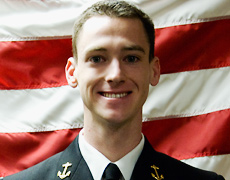Two Berkeley seniors earn prestigious Armed Forces med-school scholarships
| 25 February 2009
BERKELEY — When sporting their campus colors — he in his Cal Band uniform, she in her varsity crew T-shirt — Tyler Steed and Vanna Rocchi blend in with their peers in Berkeley's Class of '09. But the two seniors also wear other campus garb — the khakis, whites, and blues of the campus's Naval Reserve Officers Training Corps (NROTC).
Audio clips ![]()

Tyler Steed on Navy life and the ROTC at Berkeley (51 seconds)

Vanna Rocchi on the Navy
and being female in ROTC (75
seconds)
Soon they may don still other uniforms — the scrubs and lab coats of the medical profession. The two Navy midshipmen, along with just 10 other students nationwide, have been chosen to receive a prestigious Armed Forces Health Professional Scholarship, which provides tuition and living expenses for the medical school of one's choice, in return for service as a U.S. military doctor upon completion of one's M.D.
"I was ecstatic. I'm still reeling from it," Steed says of learning he'd been selected for the scholarship. "Not many students join ROTC and then go into Navy medicine, he adds. "Vanna and I are trying to cut our own path."
Between studying for the med-school admission test, completing applications, playing trumpet in the Cal Band, and serving as battalion leader at the campus's ROTC unit, "it's been kind of a crazy ride" he says of his senior year. Currently, medical-school interviews occupy many of his waking hours.
Steed hopes to become a physician-researcher. (As an undergrad he's been studying Alzheimer's Disease in a campus research lab, and hopes to investigate traumatic brain injury). Rocchi — after shadowing a UCSF surgeon specializing in shoulder and knee repair — would like to become an orthopedic surgeon.
"I really like the idea of being able to serve my country," she says. "… Once I realized I could be a doctor in the Navy, I thought that would be the perfect contribution to society."
Navy pilot's son
The son of a U.S. Navy fighter pilot, Steed lived the classic childhood of the "military brat," with serial "homes" in California, Florida, Virginia, Germany, Rhode Island, and Arkansas. It was a lifestyle he came to like — not only the constant changes in scenery ("I can't stand staying in one place for too long," he says), but the small, close-knit Navy community. No matter where you go in the world, "You'll see the same faces," says Steed.
Though he once hoped to attend the Naval or Air Force Academy, Steed learned, as a senior in high school, of a NROTC scholarship. That opened the door to a civilian education, one that his mother — by then divorced and raising her children on a teacher's salary — could afford. After touring the Berkeley campus "on the worst day you could see it (through relentless rain) and UCLA on the best (a day of brilliant sun)," Steed chose Cal.
He's felt right at home ever since, he says — even while toeing the line on buzz cuts, weekly military drills and inspections, and "zero tolerance" of drug and alcohol consumption. NROTC students are required to take — on top of the standard Berkeley course load — courses on naval war history, engineering, ethics, leadership, management, navigation, naval weapons systems, and other topics. And each does a summer cruise on a Navy vessel during his or her college career. Steed's took him to Bahrain and Dubai, on the North Arabian Gulf.
Now on the final stretch of his undergraduate career, he looks forward to May 24, when he'll receive both his UC Berkeley diploma and, in a separate ceremony, his military commission and the gold pin insignia marking a new rank: Navy ensign.
Navy captain's granddaughter
Rocchi, for her part, hopes that her grandfather, a retired Navy captain, will "pin" her at the May commissioning ceremony. The gold bar will go on her lapel next to six ribbon's she's earned in NROTC for achievements like "physical excellence" and "military aptitude."
Initially "scared of chemistry," she settled on an integrative biology major after taking a dynamite human-anatomy class. For her summer cruise, sophomore year, Rocchi sailed on the U.S.S. Tortuga, an amphibious ship that was transporting 300 Marines to Australia. Onboard, she was impressed by the ship's doctor, who "never became overwhelmed, and who took care of people's minor and major illnesses," says Rocchi. "Wow, I want to do that too,'" she recalls thinking.
A member of the varsity women's gymnastics team her first two years at Cal, Rocchi switched sports her junior year. "I have a competitive spirit, and didn't like sitting on the sidelines," she recalls. Her dad suggested she try out for crew, where her arm strength, surely, would be a great advantage. "Little did I know that it's almost completely legs!" she says.
Rowing, with its steep learning curve, suits Rocchi. "There's no limits to where you can go," she says. And it doesn't hurt that that the team is "awesome," as she puts it. Her physical preparation for varsity athletics has served her well in NROTC, with its circuit trainings and full-body workouts. At battalion field meets, Rocchi says, "It's cool to motivate everyone to keep going. The endorphins are pumping, … the competition is flowing!"
Related coverage of ROTC and veteran programs at Berkeley:
